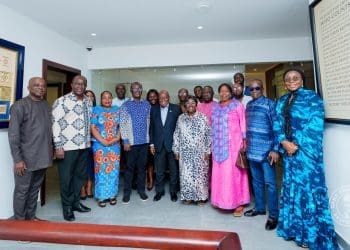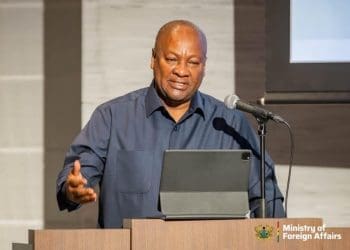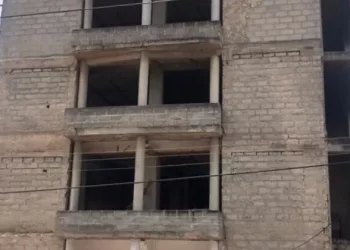At the 80th session of the United Nations General Assembly in New York, President John Dramani Mahama delivered a powerful address that reframed global debates on migration, climate change, and international governance.
He declared that many of the migrants Western countries view as a problem are, in fact, climate refugees—people fleeing unlivable conditions caused largely by greenhouse gas emissions from developed nations.
Migrants as victims of climate crisis
Mahama argued that the Global North is responsible for 75% more greenhouse gas emissions than the Global South, yet it is poorer nations that bear the harshest consequences.
“When the desert encroaches and our villages and towns become unliveable, we are forced to flee,” he told delegates.
He estimated that 12 million people have already been displaced, forming a new wave of climate refugees.
He urged Western nations to stop hiding behind euphemisms and dog-whistles when discussing migration.
“It’s not a mystery that when leaders of Western nations complain of their migration problems, they are often referring to immigrants from the Global South,” Mahama declared.
Citing Somali-British poet Warsan Shire, Mahama stressed the desperation behind migration: “No one puts their children in a boat unless the water is safer than the land.”
Contributions of migrants cannot be ignored
The former president warned against normalising cruelty, xenophobia, and racism.
Instead, he highlighted the invaluable contributions of migrants and their descendants to societies across the globe.
“When we speak of migrants, we speak of Maame Ewusi-Mensah Frimpong, a judge of the US District Court in California; Peter Bossman, the first Black mayor in Slovenia and Eastern Europe; T-Michael, the Ghanaian-Norwegian designer; and Kofi Annan, Nobel Peace laureate and former UN Secretary-General,” Mahama said.
“These are not invaders or criminals, but individuals who have brought great distinction to their adopted homelands.”
Africa as a catalyst for change
Mahama painted Africa as a catalyst for human potential, economic reform, and ecological stability.
He argued that the continent’s development potential should no longer be obscured by outdated worldviews rooted in racism, colonialism, and imperialism.
He tied this to Ghana’s domestic ambitions, noting that the 24-Hour Economy Initiative promises to transform livelihoods and build trust in governance.
UN at 80: Time for reset
Reflecting on the eight decades since the UN’s founding, Mahama said the world has changed so radically that the institution itself must undergo a serious recalibration.
“In 1945, the sun had not yet set on the largest empire in history; international travel was mostly by sea; and television was still in black and white. Today, 100,000 commercial flights take off daily, libraries exist on pocket devices, and artificial intelligence shapes our lives,” he said.
Yet, he lamented, the UN’s governing charter remains outdated. The powerful post–World War II nations still dominate, wielding veto powers that undermine the principle of sovereign equality enshrined in Article 1 of the UN Charter.
“If this were truly the case, Africa, with its many member states, would have a permanent seat on the Security Council,” Mahama stressed, adding that veto power must not remain the preserve of five nations.
Echoing Mandela, demanding reform
President Mahama recalled Nelson Mandela’s 1995 speech at the UN’s 50th anniversary, when the South African leader called for the body to “redefine its profile and reshape its structures.”
“Thirty years later, we African leaders are still making the same request,” Mahama said, demanding a permanent African seat on the Security Council with full veto powers. “If not now, then when?”
He also pressed for a reset of the global financial architecture, which he described as rigged against Africa, and called for greater African influence in multilateral financial institutions.
Calls for global justice: Cuba, Gaza, and Sudan
President Mahama demanded the immediate removal of the US blockade on Cuba, reminding the Assembly that Cubans shed blood in Africa’s liberation struggles.
Quoting Ghana’s founding president Dr. Kwame Nkrumah, he reaffirmed Ghana’s foreign policy principle: “We seek to be friends of all and enemies to none.”
Turning to the Middle East, he denounced the humanitarian catastrophe in Gaza: “The crimes in Gaza must stop,” he said bluntly, dismissing the world’s evasions.
On Sudan, he described the conflict as the world’s largest humanitarian crisis, urging urgent international action.
Reparations for slavery and colonialism
As Africa’s champion on reparations, President Mahama vowed to push for formal recognition of the transatlantic slave trade as the greatest crime against humanity.
“More than twelve and a half million Africans were forcibly taken to create wealth for powerful Western nations,” he declared.
He demanded reparations not only for slavery but also for colonisation, resource theft, and the looting of cultural artifacts that remain outside Africa.
He reminded delegates that Western governments once paid compensation to slave owners for the loss of their “property”—a moral contradiction that still wounds Africa today.
Rising global insecurity and Africa’s self-reliance
Mahama noted that while defence budgets are ballooning, development assistance is shrinking.
Since July 2024, humanitarian aid to Africa has dropped by 40%.
In this climate of uncertainty, he said, Africa must exercise sovereignty over its natural resources to fund its own development.
UN as the modern “town square”
Concluding, Mahama reflected on the symbolism of the UN as a modern town square, akin to the plazas of old where communities gathered to debate, celebrate, and resolve disputes.
“In many ways, the United Nations is the proverbial town square of our modern global village. And it has never been more critical for us to protect this one space that brings the world’s nations together as a community,” he said.
But he also warned that new technologies, from social media to artificial intelligence, threaten to deepen division by reinforcing biases and spreading disinformation.











